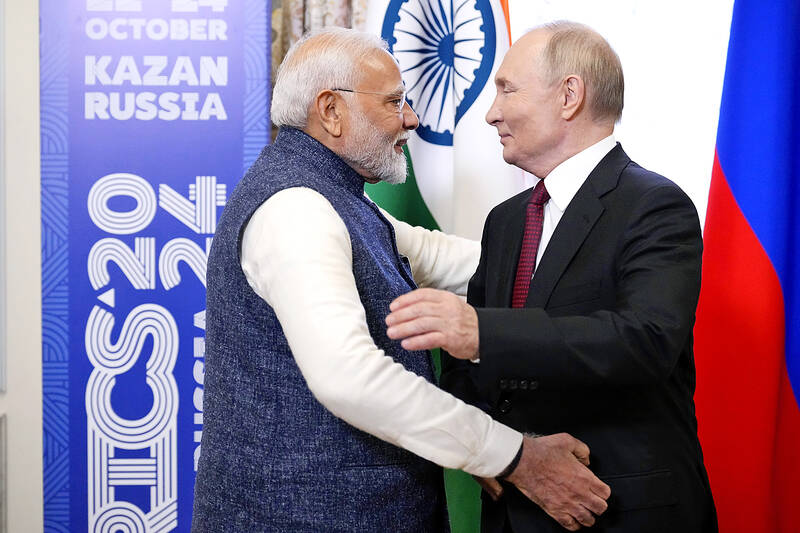Indian Prime Minister Narendra Modi yesterday said that he wanted the Ukraine conflict to be resolved peacefully and “quickly” as he met Russian President Vladimir Putin at the BRICS summit in Russia.
The three-day gathering, held amid tight security in the city of Kazan, is the biggest international event in Russia since the Ukraine conflict began in 2022, with Putin seeking to build an alliance aimed at challenging the West’s “hegemony.”
“We have been in constant touch over the conflict between Russia and Ukraine,” Modi told Putin after the two shook hands and embraced.

Photo: EPA-EFE
“We believe that disputes should only be resolved peacefully. We totally support efforts to quickly restore peace and stability,” he said.
Putin hailed what he called Russia and India’s “privileged strategic partnership” and vowed to build ties further.
New Delhi has walked a diplomatic tightrope since the Ukraine conflict began, pledging humanitarian support for Kyiv, while avoiding explicit condemnation of Russia’s offensive.
Modi visited Kyiv in August and Moscow in July in an effort to encourage talks, as India cast itself as a potential mediator.
About two dozen other leaders are to attend the summit, including Chinese President Xi Jinping (習近平), Turkish President Recep Tayyip Erdogan and UN Secretary-General Antonio Guterres.
The main issues on the agenda include Putin’s idea for a BRICS-led payment system to rival SWIFT, an international financial network that Russian banks were cut off from in 2022, and the escalating conflict in the Middle East.
The Kremlin has touted the BRICS summit as a diplomatic triumph that shows Western attempts to isolate Moscow over the Ukraine conflict have failed.
The US has dismissed the idea that BRICS could become a “geopolitical rival,” but has expressed concern over Moscow flexing its diplomatic muscle as the Ukraine conflict rages.
Moscow has steadily advanced on the battlefield in eastern Ukraine this year while strengthening ties with China, Iran and North Korea — three of Washington’s adversaries.
By gathering BRICS leaders in Kazan, the Kremlin “aims to show that not only is Russia not isolated, it has partners and allies,” Moscow-based political analyst Konstantin Kalachev said.
The International Criminal Court (ICC) issued arrest warrants for Putin last year over the illegal deportation of children from Ukraine, and the Russian leader abandoned plans to attend the previous summit in ICC member South Africa.
This time, the Kremlin wants to show an “alternative to Western pressure and that the multipolar world is a reality,” Kalachev said, referring to Moscow’s efforts to shift power away from Western nations.
In televised talks, Putin told Modi the leaders in Kazan “should take a number of important decisions, aimed at further improving the organization’s activities.”
Putin was also to meet Xi and the leaders of South Africa and Egypt yesterday, followed by separate talks with Erdogan and Iranian President Masoud Pezeshkian today.
Guterres is to sit down with Putin tomorrow, according to the Kremlin, for talks that have been criticized by Kyiv.

The Taiwanese passport ranked 33rd in a global listing of passports by convenience this month, rising three places from last month’s ranking, but matching its position in January last year. The Henley Passport Index, an international ranking of passports by the number of designations its holder can travel to without a visa, showed that the Taiwan passport enables holders to travel to 139 countries and territories without a visa. Singapore’s passport was ranked the most powerful with visa-free access to 192 destinations out of 227, according to the index published on Tuesday by UK-based migration investment consultancy firm Henley and Partners. Japan’s and

NATIONAL SECURITY THREAT: An official said that Guan Guan’s comments had gone beyond the threshold of free speech, as she advocated for the destruction of the ROC China-born media influencer Guan Guan’s (關關) residency permit has been revoked for repeatedly posting pro-China content that threatens national security, the National Immigration Agency said yesterday. Guan Guan has said many controversial things in her videos posted to Douyin (抖音), including “the red flag will soon be painted all over Taiwan” and “Taiwan is an inseparable part of China,” while expressing hope for expedited “reunification.” The agency received multiple reports alleging that Guan Guan had advocated for armed reunification last year. After investigating, the agency last month issued a notice requiring her to appear and account for her actions. Guan Guan appeared as required,

Japan and the Philippines yesterday signed a defense pact that would allow the tax-free provision of ammunition, fuel, food and other necessities when their forces stage joint training to boost deterrence against China’s growing aggression in the region and to bolster their preparation for natural disasters. Japan has faced increasing political, trade and security tensions with China, which was angered by Japanese Prime Minister Sanae Takaichi’s remark that a Chinese attack on Taiwan would be a survival-threatening situation for Japan, triggering a military response. Japan and the Philippines have also had separate territorial conflicts with Beijing in the East and South China

A strong cold air mass is expected to arrive tonight, bringing a change in weather and a drop in temperature, the Central Weather Administration (CWA) said. The coldest time would be early on Thursday morning, with temperatures in some areas dipping as low as 8°C, it said. Daytime highs yesterday were 22°C to 24°C in northern and eastern Taiwan, and about 25°C to 28°C in the central and southern regions, it said. However, nighttime lows would dip to about 15°C to 16°C in central and northern Taiwan as well as the northeast, and 17°C to 19°C elsewhere, it said. Tropical Storm Nokaen, currently